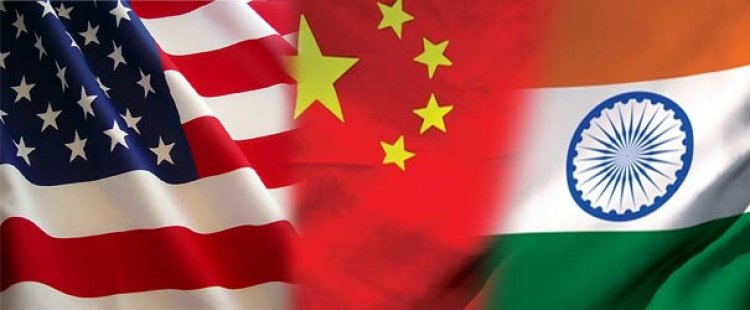Engaging with China: India should Bond with United States
STORIES, ANALYSES, EXPERT VIEWS

External Affairs Minister Subrahmanyam Jaishankar’s visit to the US was comprehensive with the agenda including vaccine supplies and areas of mutual interest. Reports indicate there were very little substantive discussion, certainly not India’s biggest foreign policy challenge - China. India is looking to understand at President Biden’s approach in the matter.
In this, the views of Kurt Campbell, the coordinator for Indo-Pacific affairs in the US National Security Council, are relevant. The period that was broadly described as engagement” with China, says Campbell “has come to an end.”
In this context, Rudra Chaudhuri (director of Carnegie India) seeks to discern Biden’s approach from the writings of the US’s current officials. “Two points are moot. First, there is an ideological, emotional, and material commitment to re-build America. ….To enable this, the administration has invested in the ‘America jobs plan’, a ‘once-in-a-generation investment in America itself,’ as Biden puts it.”
This focus “on the home-front is unlikely to endear Biden’s America to any major trading arrangement, anytime in the near future. Free trade is simply not in the wheelhouse of possibilities at this time. Further, bilateral agreements, in the near term, will be difficult to negotiate. The give has to be as good or even better than the get. This is something that India’s negotiators in the Ministry of Commerce are likely to soon learn, as they sit across the table from their American counterparts.”
Second, says Chaudhuri “there is a clear realisation that America cannot counter China “on its own.” While creating democratic alliances globally will be central to American foreign policy in the Indo-Pacific as well as allying with common values, “there is a creeping realisation that these somewhat haughty goals are difficult if not impossible to practice. There is a tension between ideals and the reality of global politics. What is clearer is that the aspirations of creating a large democratic coalition are ideas of the past. Working through smaller groupings, such as the Quad, is central to the larger approach to managing relations with China.”
What this means for India
It is too early, writes Chaudhuri “to determine what the general approach, outlined above, and the more specific task of competing with China actually means for India.
“For now, three quick conclusions might be merited. All of these are in practice, at some level, currently. First, as India deepens its relations with the Biden administration, it ought to continue to actively, and even urgently, further develop economic ties with the EU and the UK.
“Second, continue to focus on the Quad and invest greater capabilities in it. At the same time, do more with plurilateral groupings in the Indo-Pacific, such as the India-France-Australia trilateral.
“Lastly, in time – and when and only if the de-escalation on the border with China commences in earnest – discover India’s way to what will surely be a more competitive relationship with China.
“In the end, and as much as the US is a crucial partner for India, spreading foreign policy risk may just be as crucial in being able to maintain equitable ties with a Biden White House, especially as American ambitions – both ideological and material – are tested in practice.”
China at India’s doorstep
For the present, at least for India, China is at its doorstep. Just days ago, the Sri Lankan Parliament approved the $1.4 billion Colombo Port City (CPC) project with a bill rushed through at a time of pandemic. There is reportedly more to follow, including a Chinese-operated elevated highway project, and allotment of land currently being used by the Sri Lankan air force and navy.
For the Quad, writes Dr Tara Kartha (was earlier in the National Security Council Secretariat; she is now a Distinguished Fellow with the Institute of Peace and Conflict Studies), “this is an opportunity lost. The International Monetary Fund’s programme for Sri Lanka expired last year, and a fresh programme was delayed. Beijing quickly offered a $1.5 billion currency swap arrangement. India had earlier not responded to such a request, and it’s unclear if other Quad members even offered. A cautious Sri Lanka has since strengthened its naval position at Hambantota. Quad members could consider assistance in that area…..”
India must cement its relationship now
In this context, Makrand R Paranjape (Professor and Director at the Indian Institute of Advanced Study, Shimla) argues “those who believe that the United States is not to be trusted and that it is more advantageous for us to have closer ties with China are mistaken. It is not that we mustn’t strive for the latter, but what are the chances, with the red dragon’s relentless salami slicing and muscle-flexing on our borders? China will want normalcy with India, but continue to demand territory and strategic subservience from us in exchange. What is more, the balance of trade will always favour China, putting us at a perennial economic disadvantage.
“That is the nature of the neo-colonialism inaugurated by the middle kingdom, with the new Communist Emperor, Xi Jinping, presiding over its fortunes and future. What we can never forget is that we are not at war, never have been, against the US. But with China, we have an unsettled border dispute in which our men have died. Pakistan, our adversary, is also, for all practical purposes, China’s client state. When matters get worse, we will face a potentially fatal left-right knockout from both sides of our borders.
“The US, on the other hand, with a huge and powerful Indian diaspora, needs India’s help to counterbalance China……..For our own interests, we must cement our relationship now. This, after 1962, is the most opportune moment. It may not come again for several decades. India-US ties need to be taken to a higher level than ever before. We lost that opportunity during the old Cold War. Now we must not repeat that mistake in the unfolding new one.”
















